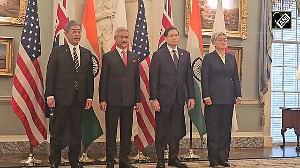The key is to act and not wait and watch before the limited window of opportunity shuts, argues Shanthie Mariet D'Souza.

Policy-making is about exploring all available options before arriving at informed decisions.
However, in the context of Taliban-controlled Afghanistan, strategic analysts and experts, waxing and waning eloquently about whether India should engage with the Taliban or not, seem to gloss over the fundamental reality that the Taliban do not subsume the entirety of Afghanistan.
Even after the fall of Kabul, Afghanistan is not just about the Taliban alone.
Hence, India's future options in that country need not be Taliban-centric.
This truism must be factored into the official policy in an age when an all-out embrace of the Taliban has become the norm for many countries.
There is much more to this country that I have known, worked, and lived in for more than a decade.
For those who advocate for engaging with the Taliban, the insurgent group represents some sort of finality for the foreseeable future.
However, what is also being forgotten is that the follow-up to the massive victory for a seemingly monolithic group has been rather poor.
The Taliban leadership -- both the visible and the invisible included -- has struggled to give shape to a government, several weeks after their white flag started fluttering in Kabul.
This unmistakably points at the internal differences within the Taliban, which is further corroborated by the group's contradictory statements on Kashmir.
The group has requested the services of Pakistan's Inter-Services Intelligence to break the logjam, which further confirms the apprehensions that the former insurgents, while trying hard to transform themselves into a governing entity, are incapable of cutting the cord that joins them with Islamabad.

These could certainly be worrying signs for India, which is still struggling to stitch together a policy that strikes a middle ground between recognising the Taliban and losing its leverage in that country.
However, much of this predicament has been the result of a policy paralysis, which in New Delhi's parlance is a 'wait-and-watch' policy.
Working under the US-led security umbrella for the last two decades, New Delhi was left in the lurch as things changed dramatically overnight in Kabul.
Even with its close cooperation with the Afghan intelligence agency, the National Directorate of Security, lasting several years, it had difficulty even in extricating its embassy staff after the Taliban takeover.
But the writing has indeed been on the wall for some time.
With no ears to the ground, India went with the US-led coalition's assurances of formation of an inclusive government, an expected outcome from a peace process that was a non-event.
The net result of this was a lost opportunity to be an important player in Afghanistan.

As a chair of the United Nations Security Council, India's performance has been rather disappointing, not befitting its rising power status.
While the decision to omit any direct reference to the Taliban in the resolutions is understandable, given the influence of the veto power-wielding members and the need to engage with the Taliban to avert a humanitarian disaster, the crisis unfolding in Afghanistan needed more immediate and coordinated effort in which India could have taken the lead.
However, it failed to play any meaningful role in the Taliban sanctions committee to ensure that the group breaks linkages with international terrorist groups.
The fact that the Taliban has not broken its ties either with the Al Qaeda or a designated terrorist organisation, the Haqqani network, was not stressed.

In the aftermath of the fall of Kabul, India did not explore the options of reaching out to the erstwhile government, currently headed by Vice-President Amrullah Saleh.
The illegitimate takeover of a democratic government should have been resisted by the democratic countries, with possibly India in the lead.
The fact that women, youth, and minorities were being metaphorically fed to the wolves should have been a strong red line to the takeover.
The women in Afghanistan had been the greatest beneficiaries and supporters of Indian projects in that country.
Instead, New Delhi remained engrossed in reaching out to the Taliban to protect its immediate interests and extricate its nationals with no long-term vision of how to engage with the new regime to form an inclusive government, protect the rights of women and minorities and dilute the extremist agenda of the totalitarian group.

India needs to get its act together.
The two decades of aid and development assistance of more than $3 billion in pledges and the goodwill that still exists needs to be capitalised and leveraged.
Beyond putting all eggs in one basket, India needs to explore other options.
Inside Afghanistan, New Delhi needs to consolidate its influence with the erstwhile government and Opposition groups to form a coalition to protect the democratic gains.
This will help reduce the probability of Afghanistan descending into a civil war.
In the region, it needs to reach out to Russia, Iran and the UAE to build a network of regional countries to form an inclusive and representative government and prevent a conflict spill-over.
At the international level, India needs to work with the UN to see that the Taliban regime does not get aid and recognition without abiding to conditionalities of an inclusive government, protection of women rights and minorities.
While it may seem that all is lost for India, the space and leverages are still available to make the right moves.
The key is to act and not wait and watch, before the limited window of opportunity shuts.
A total consolidation of power by the Taliban will be detrimental not only to India, but also to the entire region and the world at large.
Shanthie Mariet D'Souza is founding professor, Kautilya School of Public Policy, Hyderabad; founder& president, Mantraya and Non-resident scholar, Middle East Institute, Washington, DC.
Feature Presentation: Rajesh Alva/Rediff.com












 © 2025
© 2025